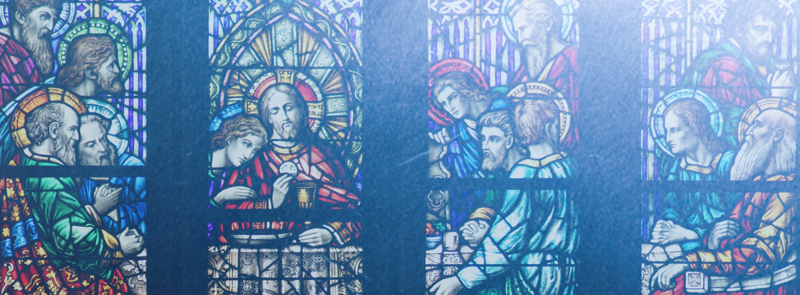Well, the skulls have been put away for another year. Each year at the beginning of November, our Latino/a community at St. Edward’s University erects their altar in our Chapel commemorating Día de los Muertos, the Day of the Dead. It is an intriguing commemoration for me, coming from an Irish/Italian influenced Christianity/Catholicism. There were very visual sights of colorful skulls and flowers on an altar interlaced with portraits of deceased family members.
For those not familiar with the tradition, I get that it must raise some questions, and frankly, most Christians outside of Catholicism and Anglicanism are a bit uncomfortable with a visual expression of Christianity. Baggage from the Reformation and others I suppose. We also held our annual Prayer of Remembrance, which brings members of our community together to remember those we have lost over the past year. We pray for those we have lost and ask for their intercessions for us with God (stay with me for a bit on that one).
Death, or Maybe It is Life?
Our observance of Dia de los Muertos and the Prayer of Remembrance at St. Edward’s University reminds us that while there are many things in our society, on our campuses, and even in our Christian faith that can seem exclusionary, death is not one of them. It comes to each of us at some point. It is a shared experience that each of us can relate to and relate to in each other. Perhaps that is the power of the incarnation and of the cross, that God chose not to be unique at that point, but to join us in such a profound revelation.
But I digress (if that is even remotely possible when talking about the Cross). The point is, that in the face of death, we are able to come together as a faith community to mourn the loss of loved ones. But it is not as simple as that. We do not gather just to lament. Christ calls us to so much more. We gather mindful that Advent is near, followed by the birth of the anointed one who will crush the power of death. So, it is a hopeful remembrance that yearly draws our community together.
I’ll be honest, for most of my life I did not pay much attention to the role of death in one’s life. I had never really experienced a close death other than my cat. It has been two years now since I lost my father on Father’s Day (yeah, that one is pretty much ruined for me). It is amazing how many things within my faith that seemed so certain before, now just don’t seem as clear. Do I doubt God’s existence any less?No, but maybe just my own understanding of the expanse of God. It makes me that much more thankful for the gift of the Incarnation and the revelation that is in Christ’s presence with us.
The Communion of Saints!
What I really find comforting about our community’s expression of our faith through Dia de los Muertos are the photos of departed saints. Both here, and during our Prayer of Remembrance, we seek the intercessions from our departed brethren and family with God. What do I mean by that? We ask them to pray for us.
As Christians, the physical death is not the end for us. Ours is an existence that continues as we move toward the fullness of being in God’s presence in that heavenly realm. Because that is outside of our earthly understanding, we can get a little nervous about that. There have certainly been abuses of such Christian beliefs, but, the body of Christ goes beyond our earthly existence.
Why ask departed people to pray for us? For the same reason that we ask our friends to pray for us. There is power in prayer and we act in faith that God’s existence and the body of Christ is not limited by our understanding of time and space.
Conclusion
The Christian walk historically and scripturally has always been a walk expressed in community. It is one of relationship, temporal, and expressed through our earthly understanding of God, but it is also a relationship with a God that surpasses our ability to comprehend. Our yearly community remembrance of those departed is not a reminder of the limitations of life as expressed in death, but is rather a witness to God’s ongoing presence in our lives and in our faith communities, far surpassing the power and limitations of death and this earthly existence. We live in the presence of a vast community of believers, not even remotely proportional to the God that J.B. Phillips alludes to in his wonderful work, “Your God is Too Small.” Through Christ, we need not fear the power of death. May we find support, relief, joy, and hope in the prayers of our faith communities as we seek Christ daily. Amen.
Dr. James Puglisi is the Associate Director of Campus Ministry at St. Edward’s University in Austin, Texas. He received his Bachelor of Arts (1984) from Allegheny College, Meadville, PA in Anthropology of Religions. He holds a Master of Arts in Higher Education (1996) from Geneva College, Beaver Falls, PA, and a Master of Arts in Applied Theology (2002) from Wheeling Jesuit University. He was awarded a Doctor of Ministry from Catholic Theological Union (2008) in the area of Practical Theology. His doctoral writing was titled “Shalom: The Role of Truth Telling in Creating Communities of Racial Reconciliation within Institutions of Christian Higher Education.” He is actively involved in interfaith and ecumenical work at St. Edward’s University and in the larger Austin Community. In addition to his work in campus ministry, he teaches courses in the cultural foundations curriculum in the area of migration, culture, and diversity. He has presented at conferences on racial reconciliation and inter-religious dialogue. He is originally from Pittsburgh, PA.

